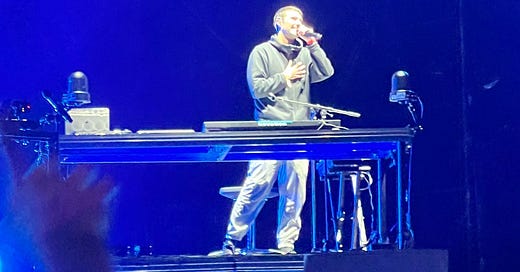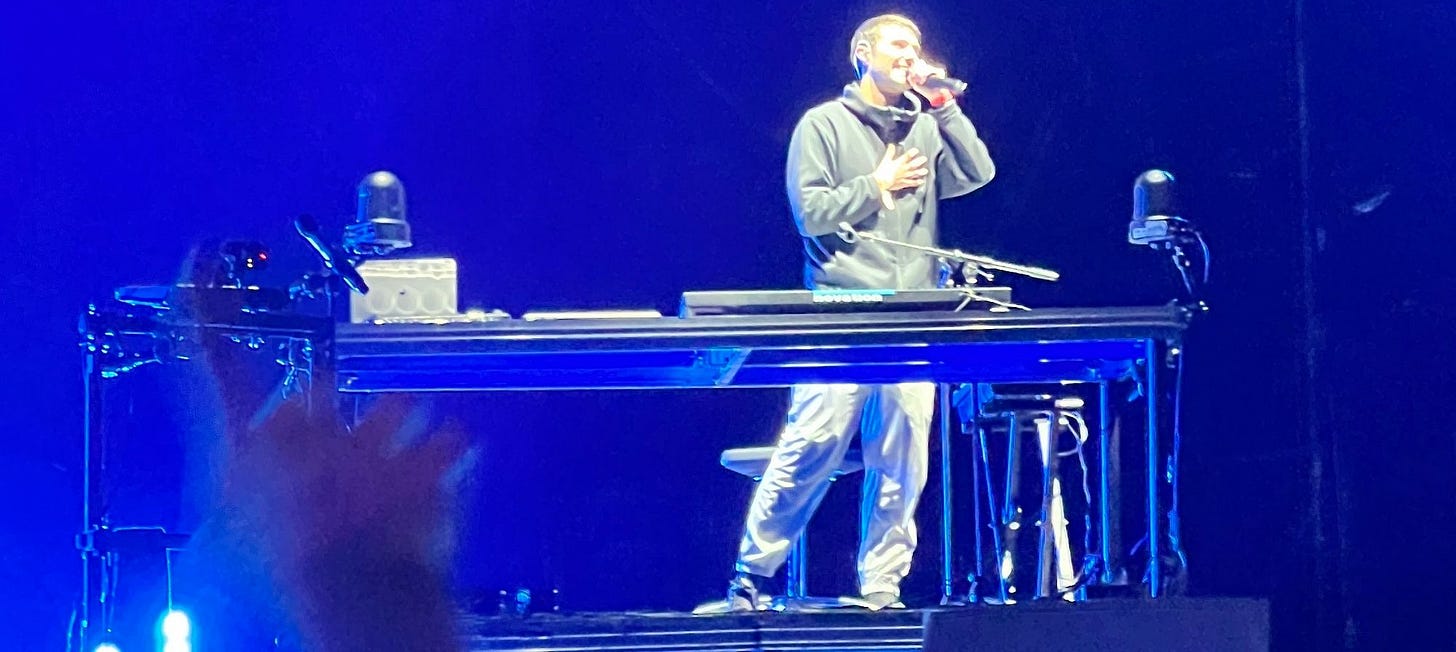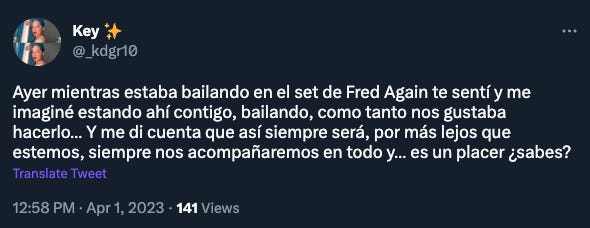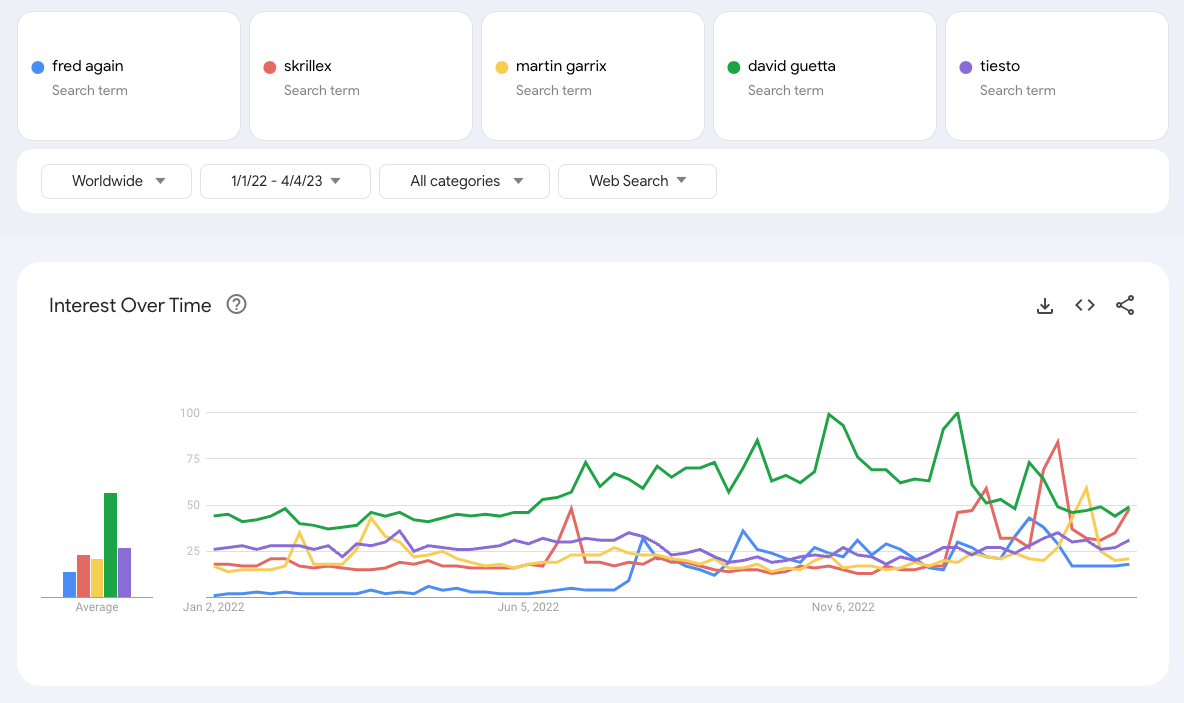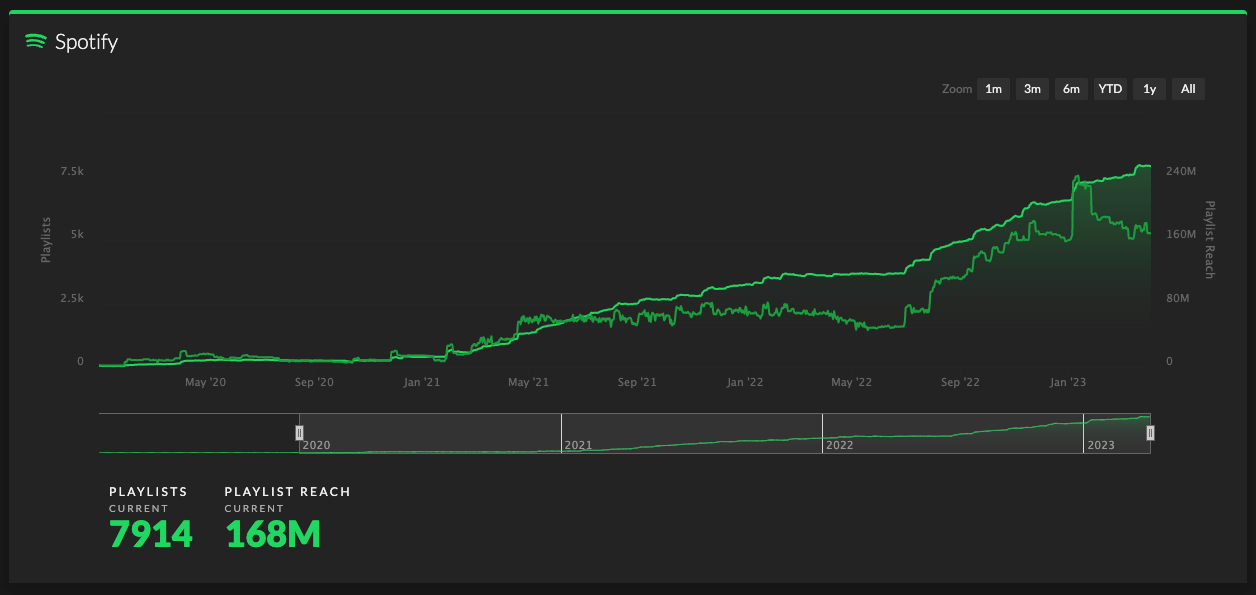Fred Again bottles an intimate feeling in an electronic rhythm. And makes you understand and accept it in a song. Combining poetry, piano, beats, and voice.
Fred Again is also VERY hated because, to enjoy him, he demands that you concentrate.
I discovered him 2 years ago with "Kyle (i found you)," where he takes a video from the poet Guante, disassembles the poetry into 4 major phrases and makes you feel them:
In this smoking chaos, our shoulder blades kissed
I found you
I found you beautiful
I found you exploding
Fred Again isn't enjoyed the first time. In your mind you'll think:
Why does the lyrics matter in an electronic song?
Why is he so famous if the beat isn't that danceable?
What is he doing with his fingers at concerts?
Why are the song titles so strange?
I don't want to do homework to listen to techno!
During the pandemic, when he started making music on his own, the love of his life got very sick. That's how his career began: between music and his phone, between composing and the hospital.
Fred writes songs, composes rhythms, melodies, beats, mixes, creates audiovisuals, and organizes his own shows. In the video for "Julia (deep diving)," you see his creative process:
Takes a small poem from "Julia's" Instagram
Converts the voice into music
Adds other pieces of voice, sound, and rhythm
All between restaurants, the train in London, and his own home
Maybe you know his song "Marea (we lost dancing)," which is very energetic and ideal for dancing in a club.
Or "Turn On The Lights" with Swedish House Mafia, which is already a phenomenon in the playlists of Armin Van Buuren, Skrillex, Bizarrap, and Anyma.
Or his spectacular "Boiler Room," where he mixed his discography in a London club and popularized his ability to use the beat sampler live (minute 35:55).
I saw Fred in New York when, together with Skrillex and Four Tet, they filled Madison Square Garden at the launch of the album the three made in Brooklyn: Quest for Fire. With the star song: Rumble.
Fred with Skrillex is a nuclear explosion. Sonny's energy, Four Tet's discipline, and Fred's honesty create a musical texture that makes you scream, jump, dance, and cry all in one package.
It was the best concert of my life.
Then I saw him again, alone, at Estéreo Picnic. And I understood Fred Again's message with his albums. The immense and beautiful humanity he brings.
Fred Again's current show is almost a theatrical work. Instagram clips, combined with his piano, his live beat sampler, and his spectacular and minimalist use of lights, colors, and a unique way of encouraging the audience.
At minute 46:12 of that concert, you'll see Fred take a poem explaining that depression is a party, break it into pieces, and turn it into a real party (49:26). The song is called "Sabrina (i am a party)"
At 1:00:20 you see his masterful use of the piano creating an explosive moment with Marea. Or at 1:10:31 where he starts recording the audience and makes a girl go from dancing shyly to dancing as if no one was watching her.
The only correct way to dance.
I know it's impossible to ask you this, but if for one hour you could put all your attention and focus on the concert above, you would understand me. It's like seeing a MoMA exhibit.
OK, two more stories.
Fred never gives interviews or talks much about himself. He's reserved and a bit awkward with the press. In part, he says, because in his videos and songs he is transparent.
An example is "Billie (loving arms)": A close friend had a broken heart, so he and his roommates took her to a festival outside London to fill her with love and friendship. Look at the context at the beginning of the video and feel the rest:
There are many types of love. And the love that comes from true friendship is as deep, necessary, and real as romantic love. It hurts similarly, heals similarly.
In the powerful "Me (heavy)," his only song where he is the center, in which he speaks to his love, sick, in the hospital. Listen to the lyrics with the context I gave you:
It's the same apartment as "Dermot (see yourself in my eyes)," together with the same roommates. The same ones from Billie. The same ones from Angie. Transparent.
In "Admit it (u don't want 2)" he takes a short phrase and turns it into an entire story. At the beginning of the song he tells us:
You don't want to
You don't want to
You don't want to
Until the song rises and rises and rises to the drop, where he reveals the complete phrase:
You don't want to admit that it hurts you
And then he drills it into us, like a request, a demand:
Admit that it hurts you
Admit that
Admit that
Admit that it hurts you
Yes, Fred comes from a connected family in England and his childhood neighbor is the legendary Brian Eno. But his art is undeniable.
It saddens me a bit that Fred is so famous now. Not for hipster reasons, but because part of his artistic process included sharing that pain, affection, anguish, and joy of a normal life.
Fred is today one of the fastest-growing DJs in the world. Filling stadiums, sharing stages with giants, and receiving millions of "listens" on Spotify and other platforms.
He will no longer be able to compose on the subway, go to a park to mix alone, or get lost in the crowd at a party.
Fame, as Rosalía says, is a bad lover. Hopefully his quality, even as it changes, will transform into something more powerful.
If not, he might do like Skrillex, who after disappearing for 10 years, brought us two albums as spectacular as Quest of Fire and Don't Get Too Close.
I believe in Fred.
We're gonna make it through.
[The songs from this post are in my Playlist: ❤️🩹 Freddy Healing Raves]

